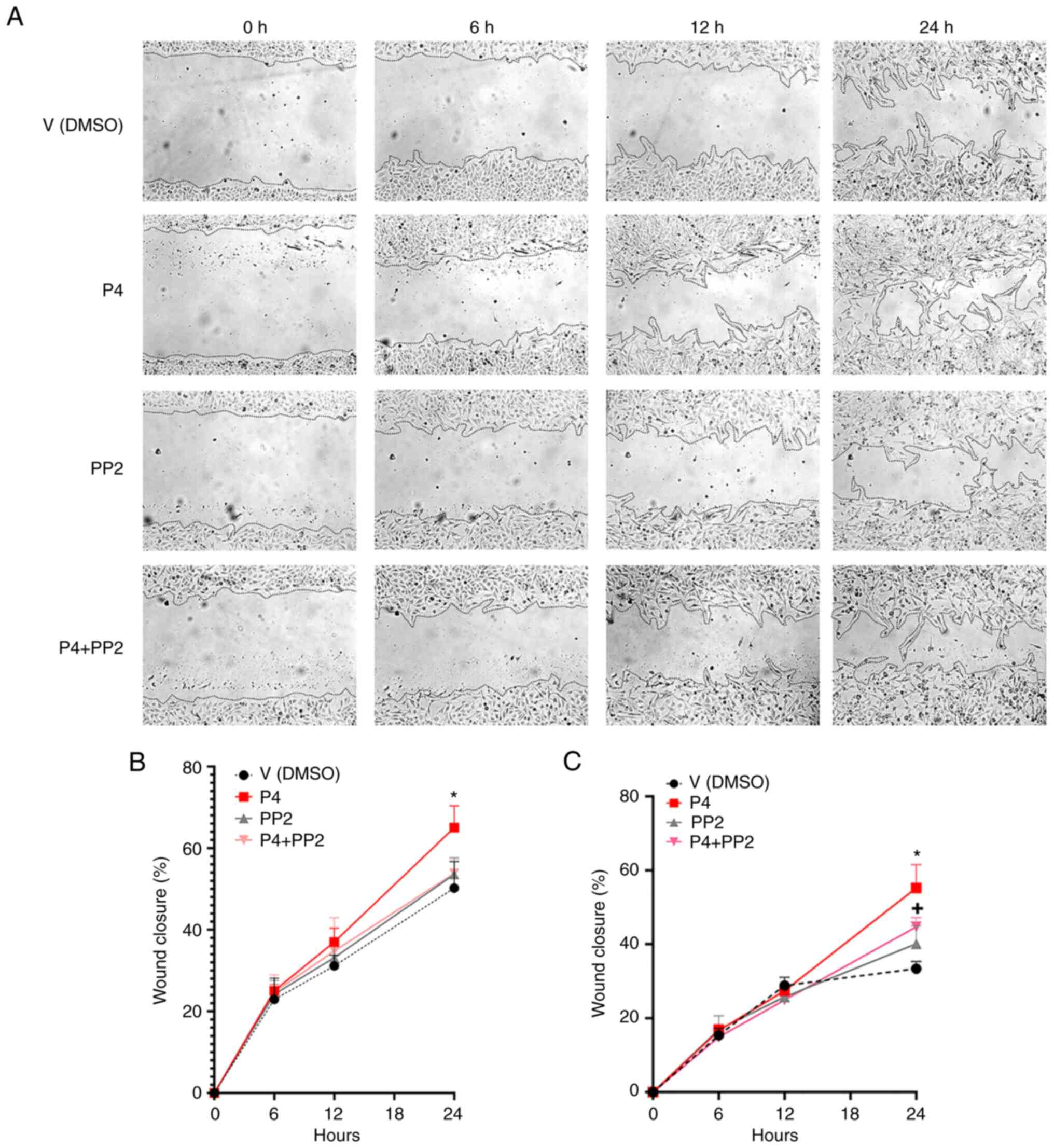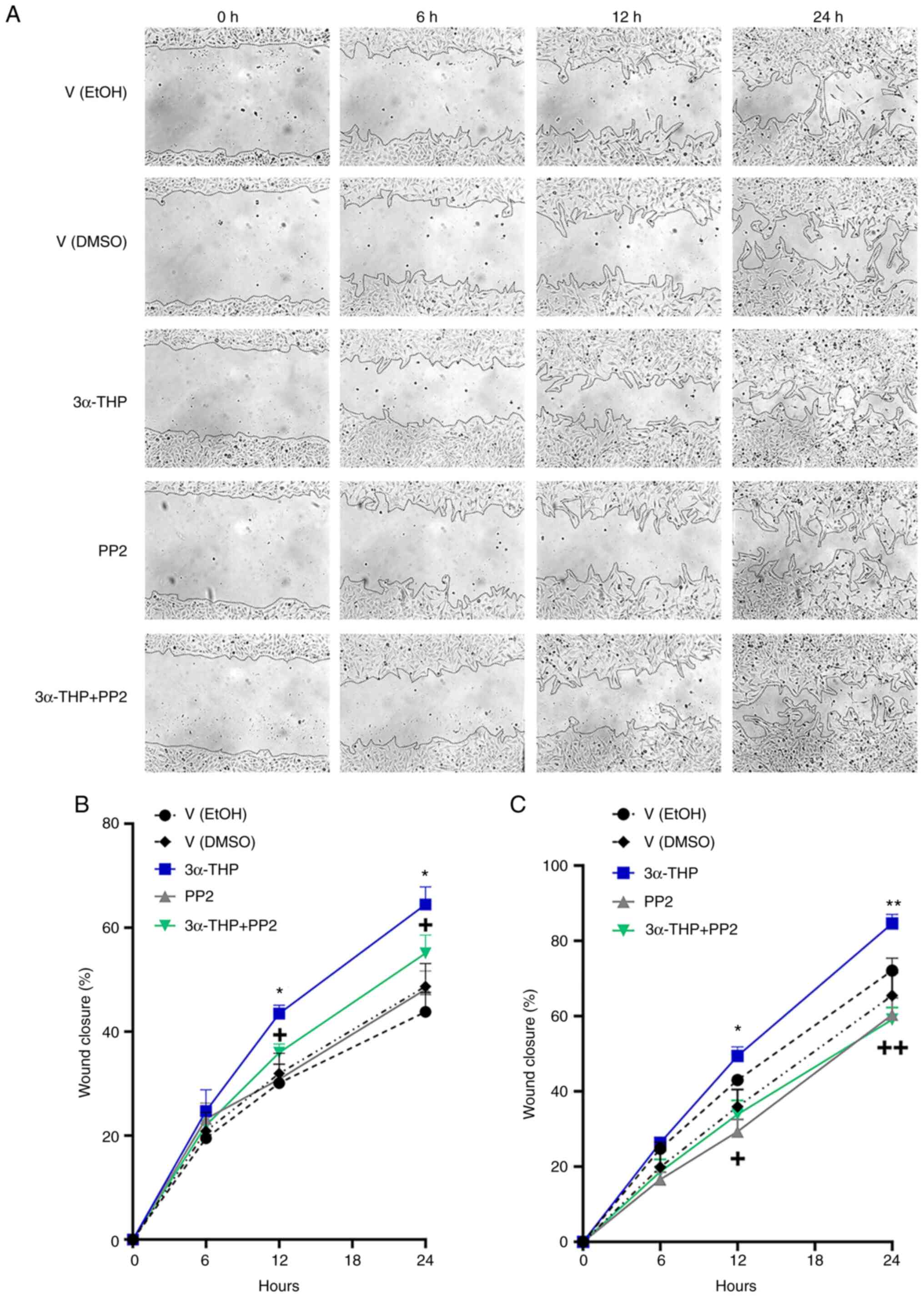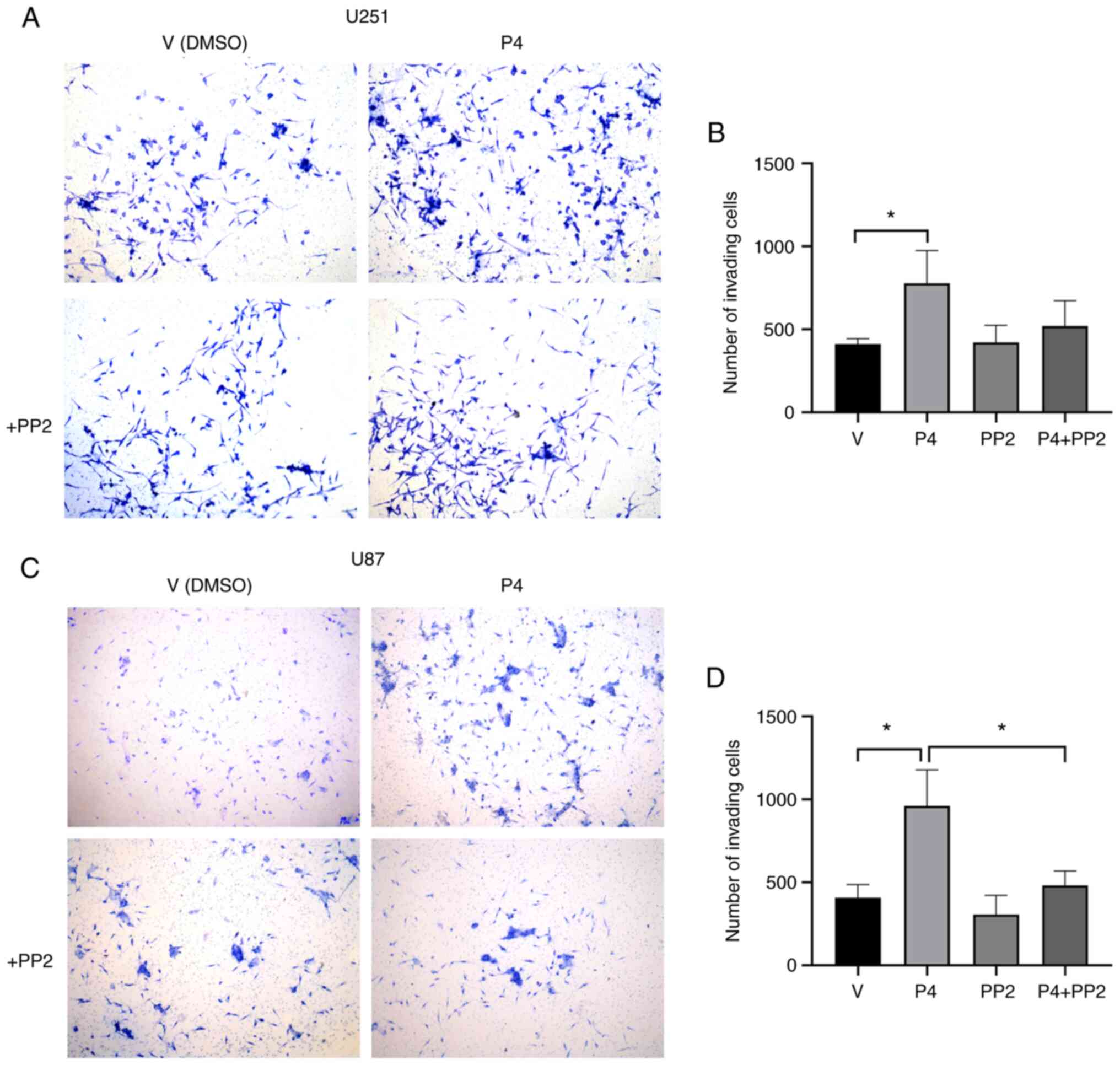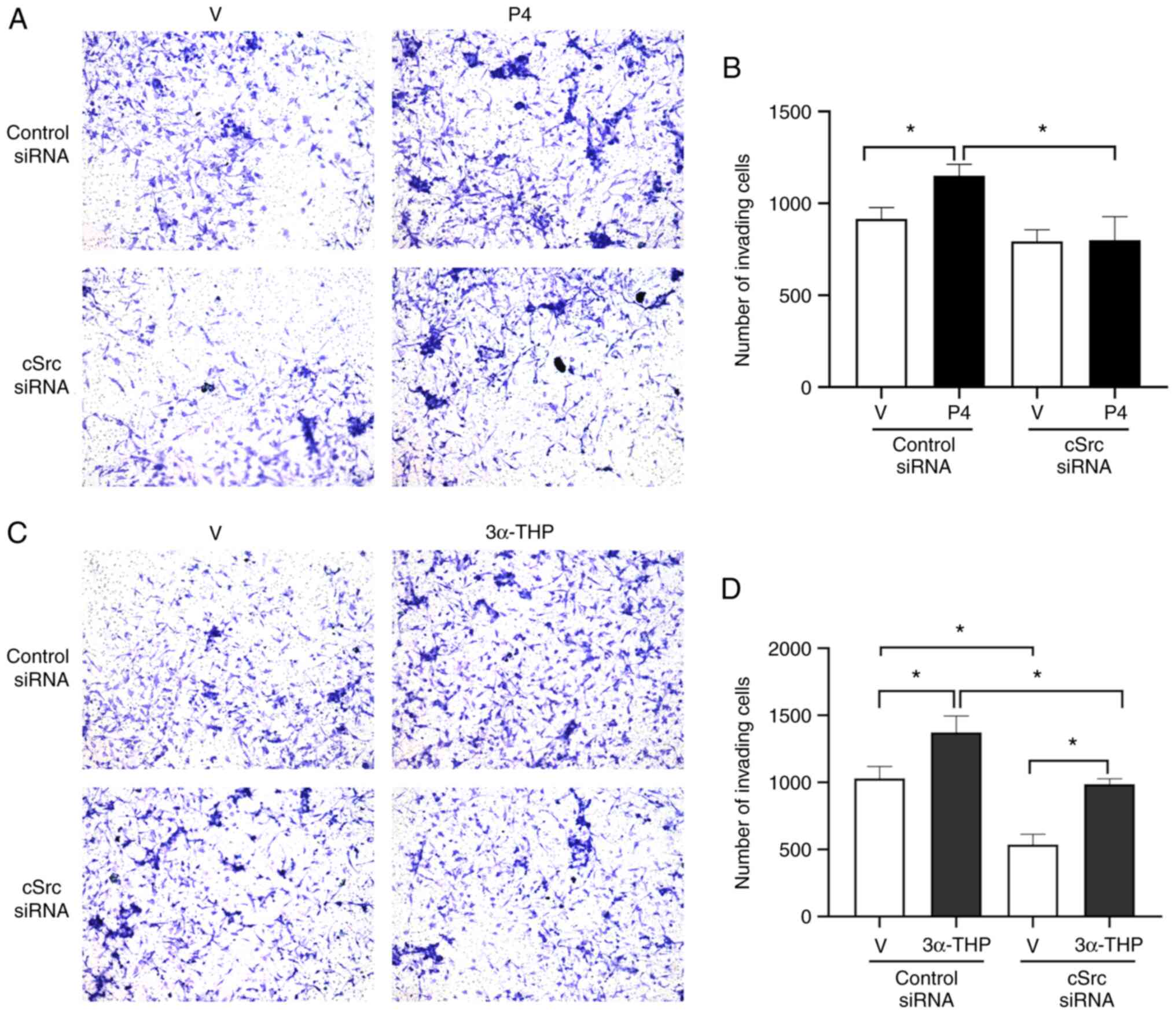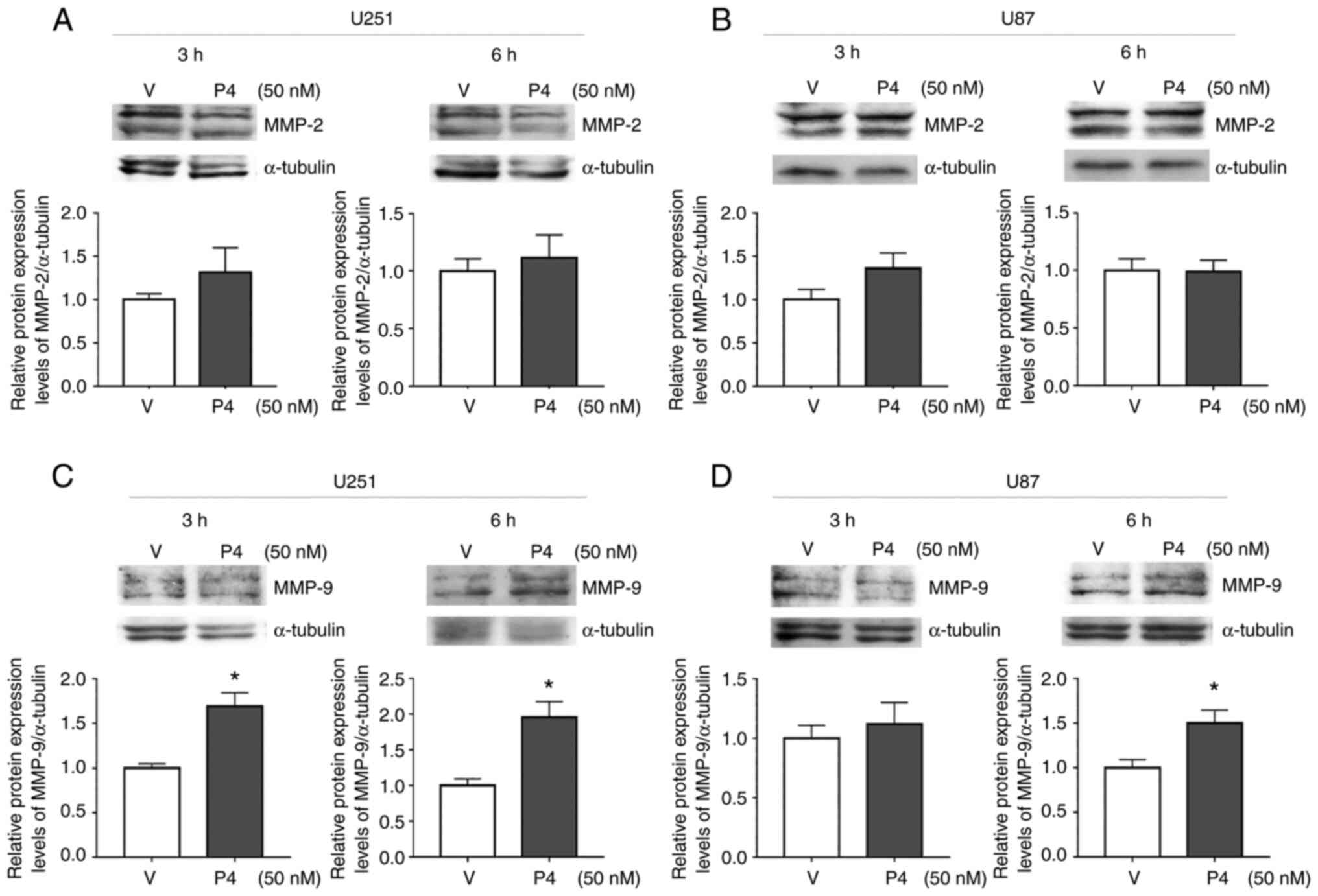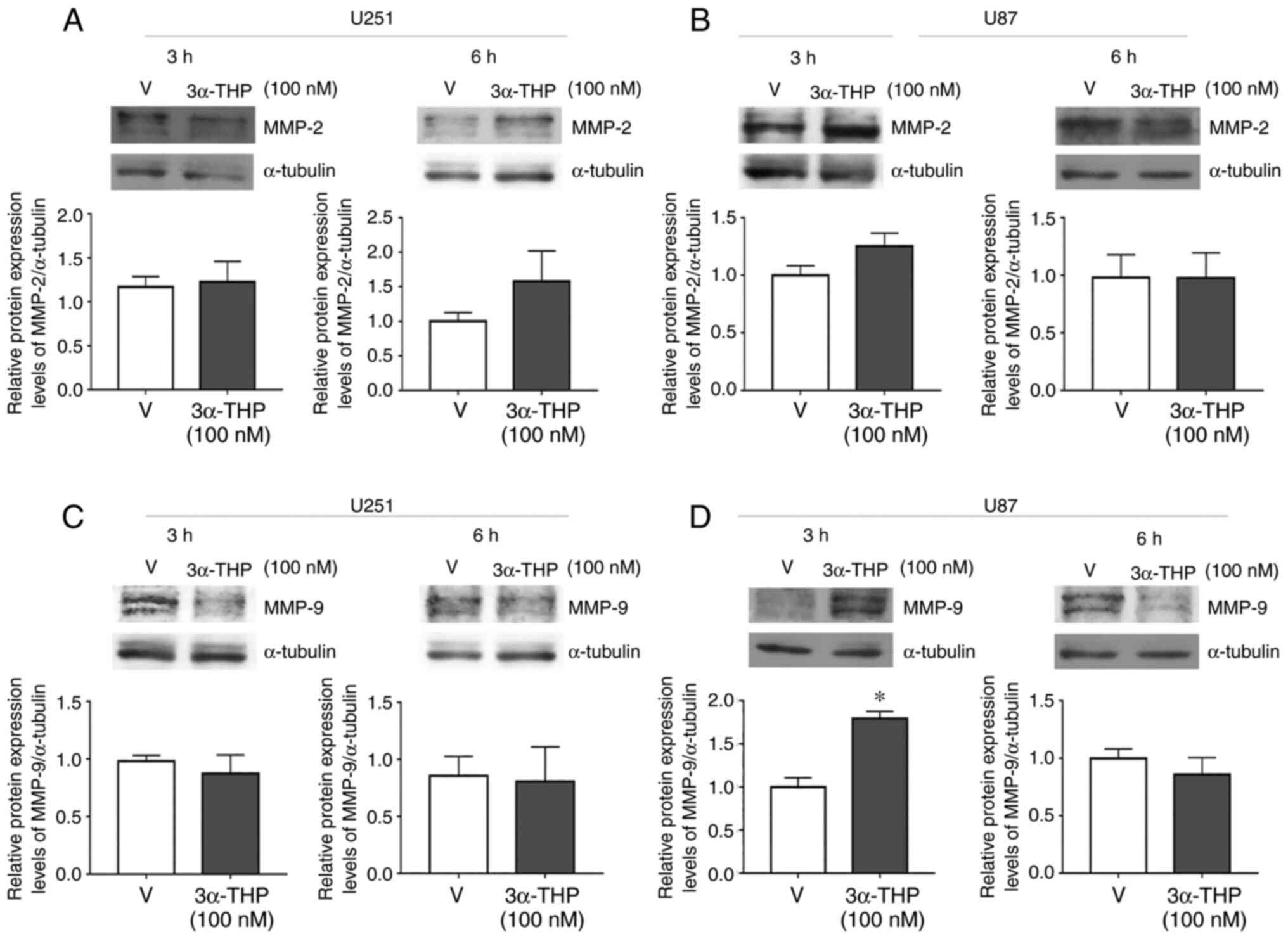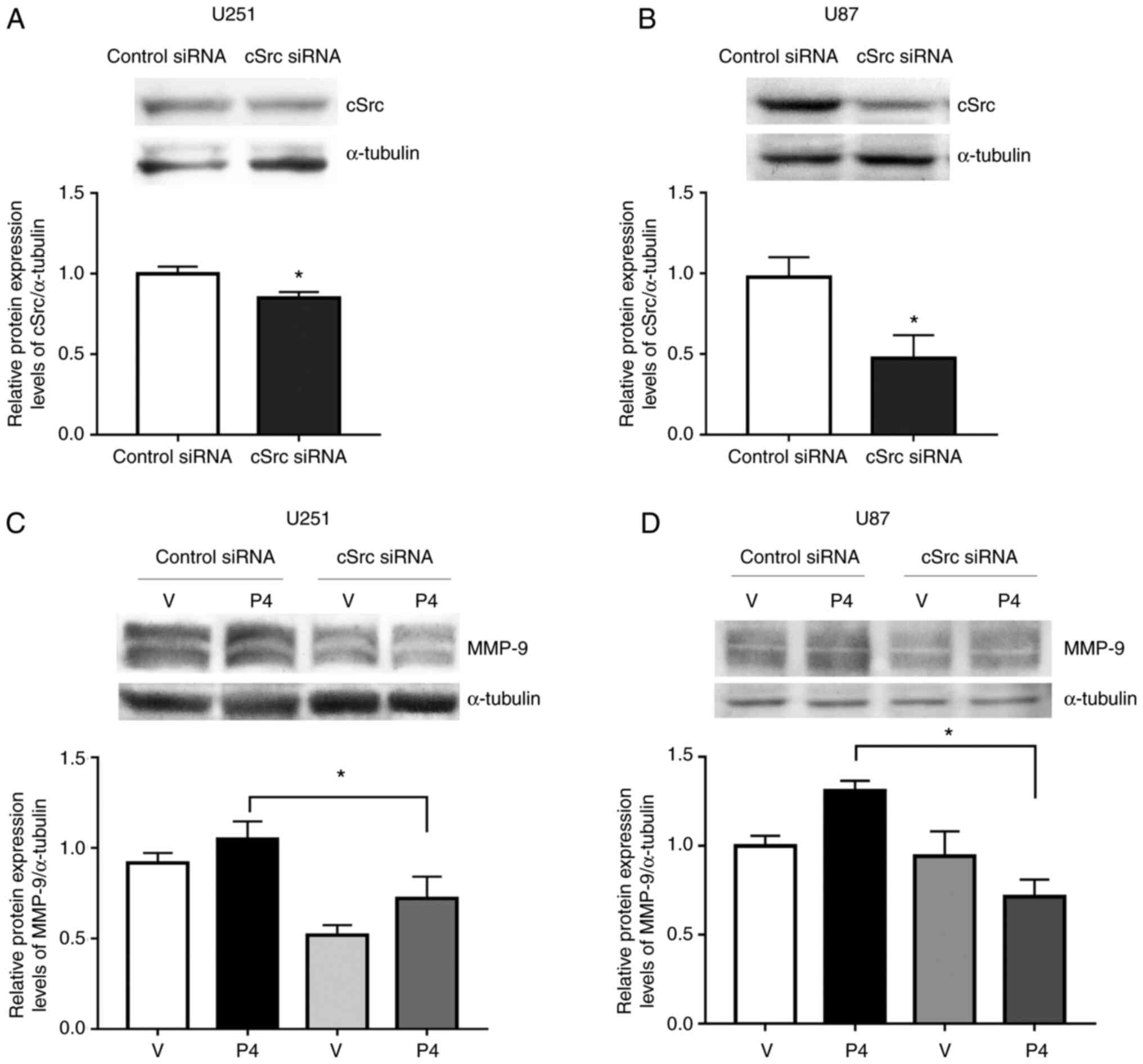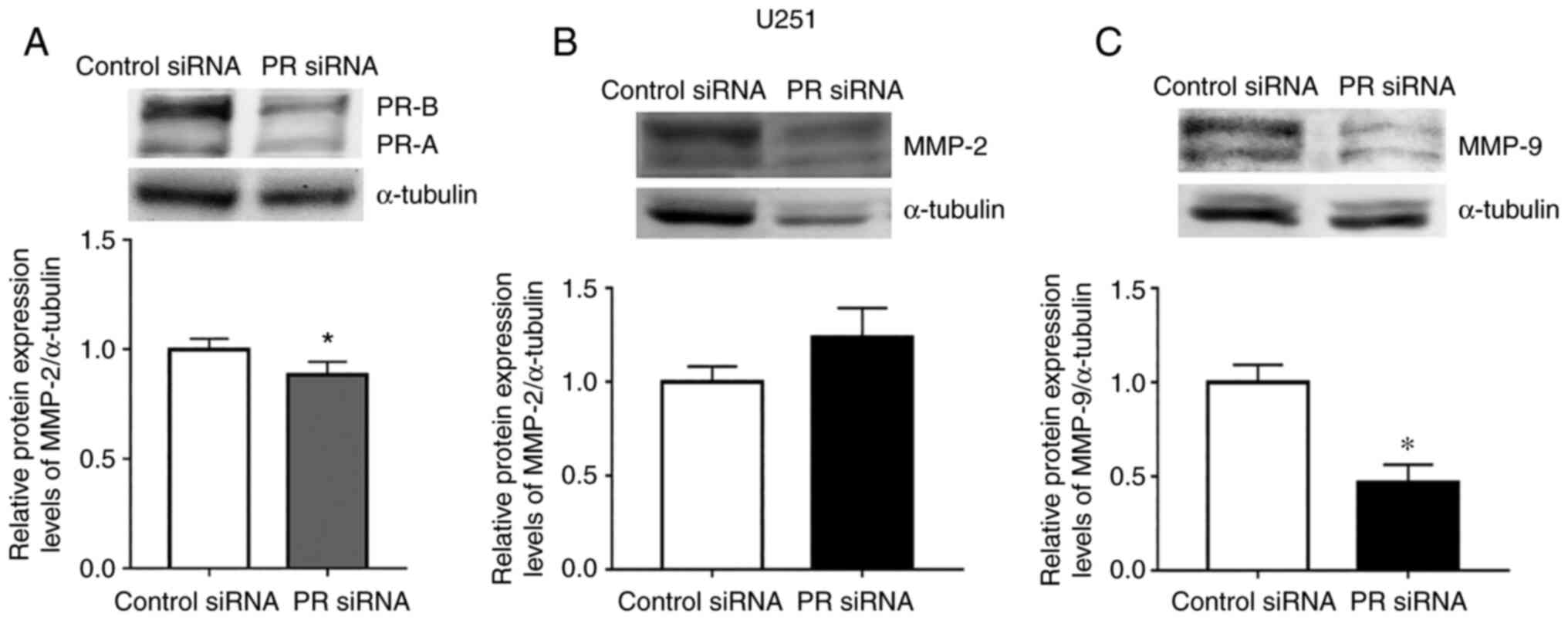|
1
|
Ostrom QT, Gittleman H, Truitt G, Boscia
A, Kruchko C and Barnholtz-Sloan JS: CBTRUS statistical report:
Primary brain and other central nervous system tumors diagnosed in
the United States in 2011–2015. Neuro Oncol. 20:iv1–iv86. 2018.
View Article : Google Scholar : PubMed/NCBI
|
|
2
|
Giese A, Bjerkvig R, Berens ME and
Westphal M: Cost of migration: Invasion of malignant gliomas and
implications for treatment. J Clin Oncol. 21:1624–1636. 2003.
View Article : Google Scholar : PubMed/NCBI
|
|
3
|
Patel A, Sabbineni H, Clarke A and
Somanath PR: Novel roles of Src in cancer cell
epithelial-to-mesenchymal transition, vascular permeability,
microinvasion and metastasis. Life Sci. 157:52–61. 2016. View Article : Google Scholar : PubMed/NCBI
|
|
4
|
Cortes-Reynosa P, Robledo T, Macias-Silva
M, Wu SV and Salazar EP: Src kinase regulates metalloproteinase-9
secretion induced by type IV collagen in MCF-7 human breast cancer
cells. Matrix Biol. 27:220–231. 2008. View Article : Google Scholar : PubMed/NCBI
|
|
5
|
Gautam J, Banskota S, Lee H, Lee YJ, Jeon
YH, Kim JA and Jeong BS: Down-regulation of cathepsin S and matrix
metalloproteinase-9 via Src, a non-receptor tyrosine kinase,
suppresses triple-negative breast cancer growth and metastasis. Exp
Mol Med. 50:1–14. 2018. View Article : Google Scholar : PubMed/NCBI
|
|
6
|
Zhou W, Yu X, Sun S, Zhang X, Yang W,
Zhang J, Zhang X and Jiang Z: Increased expression of MMP-2 and
MMP-9 indicates poor prognosis in glioma recurrence. Biomed
Pharmacother. 118:1093692019. View Article : Google Scholar : PubMed/NCBI
|
|
7
|
Forsyth PA, Wong H, Laing TD, Rewcastle
NB, Morris DG, Muzik H, Leco KJ, Johnston RN, Brasher PM,
Sutherland G and Edwards DR: Gelatinase-A (MMP-2), gelatinase-B
(MMP-9) and membrane type matrix metalloproteinase-1 (MT1-MMP) are
involved in different aspects of the pathophysiology of malignant
gliomas. Br J Cancer. 79:1828–1835. 1999. View Article : Google Scholar : PubMed/NCBI
|
|
8
|
Kondraganti S, Mohanam S, Chintala SK, Kin
Y, Jasti SL, Nirmala C, Lakka SS, Adachi Y, Kyritsis AP, Ali-Osman
F, et al: Selective suppression of matrix metalloproteinase-9 in
human glioblastoma cells by antisense gene transfer impairs
glioblastoma cell invasion. Cancer Res. 60:6851–6855.
2000.PubMed/NCBI
|
|
9
|
Trabert B, Sherman ME, Kannan N and
Stanczyk FZ: Progesterone and breast cancer. Endocr Rev.
41:320–344. 2020. View Article : Google Scholar : PubMed/NCBI
|
|
10
|
Grindstad T, Richardsen E, Andersen S,
Skjefstad K, Khanehkenari MR, Donnem T, Ness N, Nordby Y, Bremnes
RM, Al-Saad S and Busund LT: Progesterone receptors in prostate
cancer: Progesterone receptor B is the isoform associated with
disease progression. Sci Rep. 8:1–11. 2018. View Article : Google Scholar
|
|
11
|
Bello-Alvarez C and Camacho-Arroyo I:
Impact of sex in the prevalence and progression of glioblastomas:
The role of gonadal steroid hormones. Biol Sex Differ. 12:282021.
View Article : Google Scholar : PubMed/NCBI
|
|
12
|
Fu XD, Goglia L, Sanchez AM, Flamini M,
Giretti MS, Tosi V, Genazzani AR and Simoncini T: Progesterone
receptor enhances breast cancer cell motility and invasion via
extranuclear activation of focal adhesion kinase. Endocr Relat
Cancer. 17:431–443. 2010. View Article : Google Scholar : PubMed/NCBI
|
|
13
|
Grochans S, Cybulska AM, Simińska D,
Korbecki J, Kojder K, Chlubek D and Baranowska-Bosiacka I:
Epidemiology of glioblastoma multiforme-literature review. Cancers
(Basel). 14:24122022. View Article : Google Scholar : PubMed/NCBI
|
|
14
|
Germán-Castelán L, Manjarrez-Marmolejo J,
González-Arenas A and Camacho-Arroyo I: Intracellular progesterone
receptor mediates the increase in glioblastoma growth induced by
progesterone in the rat brain. Arch Med Res. 47:419–426. 2016.
View Article : Google Scholar : PubMed/NCBI
|
|
15
|
Bello-Alvarez C, Moral-Morales AD,
González-Arenas A and Camacho-Arroyo I: Intracellular progesterone
receptor and cSrc protein working together to regulate the activity
of proteins involved in migration and invasion of human
glioblastoma cells. Front Endocrinol (Lausanne). 12:6402982021.
View Article : Google Scholar : PubMed/NCBI
|
|
16
|
Piña-Medina AG, Hansberg-Pastor V,
González-Arenas A, Cerbón M and Camacho-Arroyo I: Progesterone
promotes cell migration, invasion and cofilin activation in human
astrocytoma cells. Steroids. 105:19–25. 2016. View Article : Google Scholar : PubMed/NCBI
|
|
17
|
Zamora-Sánchez CJ, Hansberg-Pastor V,
Salido-Guadarrama I, Rodríguez-Dorantes M and Camacho-Arroyo I:
Allopregnanolone promotes proliferation and differential gene
expression in human glioblastoma cells. Steroids. 119:36–42. 2017.
View Article : Google Scholar : PubMed/NCBI
|
|
18
|
Zamora-Sánchez CJ, Bello-Alvarez C,
Rodríguez-Dorantes M and Camacho-Arroyo I: Allopregnanolone
promotes migration and invasion of human glioblastoma cells through
the protein tyrosine kinase c-Src activation. Int J Mol Sci.
23:49962022. View Article : Google Scholar : PubMed/NCBI
|
|
19
|
Melfi S, Guevara MM, Bonalume V, Ruscica
M, Colciago A, Simoncini T and Magnaghi V: Src and phospho-FAK
kinases are activated by allopregnanolone promoting Schwann cell
motility, morphology and myelination. J Neurochem. 141:165–178.
2017. View Article : Google Scholar : PubMed/NCBI
|
|
20
|
Pirkmajer S and Chibalin AV: Serum
starvation: Caveat emptor. Am J Physiol Cell Physiol.
301:C272–C279. 2011. View Article : Google Scholar : PubMed/NCBI
|
|
21
|
Jabłońska-Trypuć A, Matejczyk M and
Rosochacki S: Matrix metalloproteinases (MMPs), the main
extracellular matrix (ECM) enzymes in collagen degradation, as a
target for anticancer drugs. J Enzyme Inhib Med Chem. 31:177–183.
2016. View Article : Google Scholar : PubMed/NCBI
|
|
22
|
Global Cancer Observatory, .
|
|
23
|
van Linde ME, Brahm CG, de Witt Hamer PC,
Reijneveld JC, Bruynzeel AME, Vandertop WP, van de Ven PM,
Wagemakers M, van der Weide HL, Enting RH, et al: Treatment outcome
of patients with recurrent glioblastoma multiforme: A retrospective
multicenter analysis. J Neurooncol. 135:183–192. 2017. View Article : Google Scholar : PubMed/NCBI
|
|
24
|
Gkretsi V and Stylianopoulos T: Cell
adhesion and matrix stiffness: Coordinating cancer cell invasion
and metastasis. Front Oncol. 8:1452018. View Article : Google Scholar : PubMed/NCBI
|
|
25
|
Quintero-Fabián S, Arreola R,
Becerril-Villanueva E, Torres-Romero JC, Arana-Argáez V,
Lara-Riegos J, Ramírez-Camacho MA and Alvarez-Sánchez ME: Role of
matrix metalloproteinases in angiogenesis and cancer. Front Oncol.
9:13702019. View Article : Google Scholar : PubMed/NCBI
|
|
26
|
Quesnel A, Karagiannis GS and Filippou PS:
Extracellular proteolysis in glioblastoma progression and
therapeutics. Biochim Biophys Acta Rev Cancer. 1874:1884282020.
View Article : Google Scholar : PubMed/NCBI
|
|
27
|
Cai HP, Wang J, Xi SY, Ni XR, Chen YS, Yu
YJ, Cen ZW, Yu ZH, Chen FR, Guo CC, et al: Tenascin-c mediated
vasculogenic mimicry formation via regulation of MMP2/MMP9 in
glioma. Cell Death Dis. 10:1–14. 2019. View Article : Google Scholar : PubMed/NCBI
|
|
28
|
Mirabdaly S, Komi DE, Shakiba Y, Moini A
and Kiani A: Effects of temozolomide on U87MG glioblastoma cell
expression of CXCR4, MMP2, MMP9, VEGF, anti-proliferatory cytotoxic
and apoptotic properties. Mol Biol Rep. 47:1187–1197. 2020.
View Article : Google Scholar : PubMed/NCBI
|
|
29
|
Chen CJ, Shang HS, Huang YL, Tien N, Chen
YL, Hsu SY, Wu RSC, Tang CL, Lien JC, Lee MH, et al:
Bisdemethoxycurcumin suppresses human brain glioblastoma multiforme
GBM 8401 cell migration and invasion via affecting NF-κB and MMP-2
and MMP-9 signaling pathway in vitro. Environ Toxicol.
37:2388–2397. 2022. View Article : Google Scholar : PubMed/NCBI
|
|
30
|
Li Q, Chen B, Cai J, Sun Y, Wang G, Li Y,
Li R, Feng Y, Han B, Li J, et al: Comparative analysis of matrix
metalloproteinase family members reveals that MMP9 predicts
survival and response to temozolomide in patients with primary
glioblastoma. PLoS One. 11:e01518152016. View Article : Google Scholar : PubMed/NCBI
|
|
31
|
González-Agüero G, Gutiérrez AA,
González-Espinosa D, Solano JD, Morales R, González-Arenas A,
Cabrera-Muñoz E and Camacho-Arroyo I: Progesterone effects on cell
growth of U373 and D54 human astrocytoma cell lines. Endocrine.
32:129–135. 2007. View Article : Google Scholar : PubMed/NCBI
|
|
32
|
Hernández-Hernández OT, González-García TK
and Camacho-Arroyo I: Progesterone receptor and SRC-1 participate
in the regulation of VEGF, EGFR and cyclin D1 expression in human
astrocytoma cell lines. J Steroid Biochem Mol Biol. 132:127–134.
2012. View Article : Google Scholar : PubMed/NCBI
|
|
33
|
González-Arenas A, Valadez-Cosmes P,
Jiménez-Arellano C, López-Sánchez M and Camacho-Arroyo I:
Progesterone-induced blocking factor is hormonally regulated in
human astrocytoma cells, and increases their growth through the
IL-4R/JAK1/STAT6 pathway. J Steroid Biochem Mol Biol. 144:463–470.
2014. View Article : Google Scholar : PubMed/NCBI
|
|
34
|
Strom JO, Theodorsson A and Theodorsson E:
Hormesis and female sex hormones. Pharmaceuticals (Basel).
4:726–740. 2011. View Article : Google Scholar : PubMed/NCBI
|
|
35
|
Atif F, Yousuf S and Stein DG: Anti-tumor
effects of progesterone in human glioblastoma multiforme: Role of
PI3K/Akt/mTOR signaling. J Steroid Biochem Mol Biol. 146:62–73.
2015. View Article : Google Scholar : PubMed/NCBI
|
|
36
|
Diviccaro S, Cioffi L, Falvo E, Giatti S
and Melcangi RC: Allopregnanolone: An overview on its synthesis and
effects. J Neuroendocrinol. 34:e129962022. View Article : Google Scholar : PubMed/NCBI
|
|
37
|
Thomas P and Pang Y: Membrane progesterone
receptors: Evidence for neuroprotective, neurosteroid signaling and
neuroendocrine functions in neuronal cells. Neuroendocrinology.
96:162–71. 2012. View Article : Google Scholar : PubMed/NCBI
|
|
38
|
Pang Y, Dong J and Thomas P:
Characterization, neurosteroid binding and brain distribution of
human membrane progesterone receptors δ and {epsilon} (mPRδ and
mPR{epsilon}) and mPRδ involvement in neurosteroid inhibition of
apoptosis. Endocrinology. 154:283–295. 2013. View Article : Google Scholar : PubMed/NCBI
|
|
39
|
Lamba V, Yasuda K, Lamba JK, Assem M,
Davila J, Strom S and Schuetz EG: PXR (NR1I2): Splice variants in
human tissues, including brain, and identification of neurosteroids
and nicotine as PXR activators. Toxicol Appl Pharmacol.
199:251–265. 2004. View Article : Google Scholar : PubMed/NCBI
|
|
40
|
Frye CA, Koonce CJ and Walf AA: The
pregnane xenobiotic receptor, a prominent liver factor, has actions
in the midbrain for neurosteroid synthesis and behavioral/neural
plasticity of female rats. Front Syst Neurosci. 8:602014.
View Article : Google Scholar : PubMed/NCBI
|
|
41
|
Belelli D and Gee KW: 5 alpha-pregnan-3
alpha,20 alpha-diol behaves like a partial agonist in the
modulation of GABA-stimulated chlride ion uptake by
synaptoneurosomes. Eur J Pharmacol. 167:173–176. 1989. View Article : Google Scholar : PubMed/NCBI
|
|
42
|
Zamora-Sánchez CJ, Hernández-Vega AM,
Gaona-Domínguez S, Rodríguez-Dorantes M and Camacho-Arroyo I:
5alpha-dihydroprogesterone promotes proliferation and migration of
human glioblastoma cells. Steroids. 163:1087082020. View Article : Google Scholar : PubMed/NCBI
|
|
43
|
González-Flores O, Beyer C, Gómora-Arrati
P, García-Juárez M, Lima-Hernández FJ, Soto-Sánchez A and Etgen AM:
A role for Src kinase in progestin facilitation of estrous behavior
in estradiol-primed female rats. Horm Behav. 58:223–229. 2010.
View Article : Google Scholar : PubMed/NCBI
|
|
44
|
Bergmann N, Delbridge C, Gempt J,
Feuchtinger A, Walch A, Schirmer L, Bunk W, Aschenbrenner T,
Liesche-Starnecker F and Schlegel J: The intratumoral heterogeneity
reflects the intertumoral subtypes of glioblastoma multiforme: A
regional immunohistochemistry analysis. Front Oncol. 10:4942020.
View Article : Google Scholar : PubMed/NCBI
|
|
45
|
Becker AP, Sells BE, Haque SJ and
Chakravarti A: Tumor heterogeneity in glioblastomas: From light
microscopy to molecular pathology. Cancers (Basel). 13:1–25. 2021.
View Article : Google Scholar
|
|
46
|
Motaln H, Koren A, Gruden K, Ramšak Ž,
Schichor C and Lah TT: Heterogeneous glioblastoma cell cross-talk
promotes phenotype alterations and enhanced drug resistance.
Oncotarget. 6:40998–41017. 2015. View Article : Google Scholar : PubMed/NCBI
|
|
47
|
Stettner MR, Wang W, Nabors LB, Bharara S,
Flynn DC, Grammer JR, Gillespie GY and Gladson CL: Lyn kinase
activity is the predominant cellular Src kinase activity in
glioblastoma tumor cells. Cancer Res. 65:5535–5543. 2005.
View Article : Google Scholar : PubMed/NCBI
|
|
48
|
Ramachandran RK, Sørensen MD,
Aaberg-Jessen C, Hermansen SK and Kristensen BW: Expression and
prognostic impact of matrix metalloproteinase-2 (MMP-2) in
astrocytomas. PLoS One. 12:e01722342017. View Article : Google Scholar : PubMed/NCBI
|
|
49
|
Hsia DA, Mitra SK, Hauck CR, Streblow DN,
Nelson JA, Ilic D, Huang S, Li E, Nemerow GR, Leng J, et al:
Differential regulation of cell motility and invasion by FAK. J
Cell Biol. 160:753–767. 2003. View Article : Google Scholar : PubMed/NCBI
|
|
50
|
Hsieh HL, Yu MC, Cheng LC, Chu MY, Huang
TH, Yeh TS and Tsai MM: Quercetin exerts anti-inflammatory effects
via inhibiting tumor necrosis factor-α-induced matrix
metalloproteinase-9 expression in normal human gastric epithelial
cells. World J Gastroenterol. 28:1139–1158. 2022. View Article : Google Scholar : PubMed/NCBI
|
|
51
|
Yeatman TJ: A renaissance for SRC. Nat Rev
Cancer. 4:470–480. 2004. View Article : Google Scholar : PubMed/NCBI
|
|
52
|
Mitra SK and Schlaepfer DD:
Integrin-regulated FAK-Src signaling in normal and cancer cells.
Curr Opin Cell Biol. 18:516–523. 2006. View Article : Google Scholar : PubMed/NCBI
|
|
53
|
Boonyaratanakornkit V and Edwards DP:
Receptor mechanisms mediating non-genomic actions of sex steroids.
Semin Reprod Med. 25:139–153. 2007. View Article : Google Scholar : PubMed/NCBI
|
|
54
|
Liu DT, Carter NJ, Wu XJ, Hong WS, Chen SX
and Zhu Y: Progestin and nuclear progestin receptor are essential
for upregulation of metalloproteinase in zebrafish preovulatory
follicles. Front Endocrinol (Lausanne). 9:5172018. View Article : Google Scholar : PubMed/NCBI
|
|
55
|
Ishrat T, Sayeed I, Atif F, Hua F and
Stein DG: Progesterone and allopregnanolone attenuate blood-brain
barrier dysfunction following permanent focal ischemia by
regulating the expression of matrix metalloproteinases. Exp Neurol.
226:183–190. 2010. View Article : Google Scholar : PubMed/NCBI
|
|
56
|
Yan C and Boyd DD: Regulation of matrix
metalloproteinase gene expression. J Cell Physiol. 211:19–26. 2007.
View Article : Google Scholar : PubMed/NCBI
|















